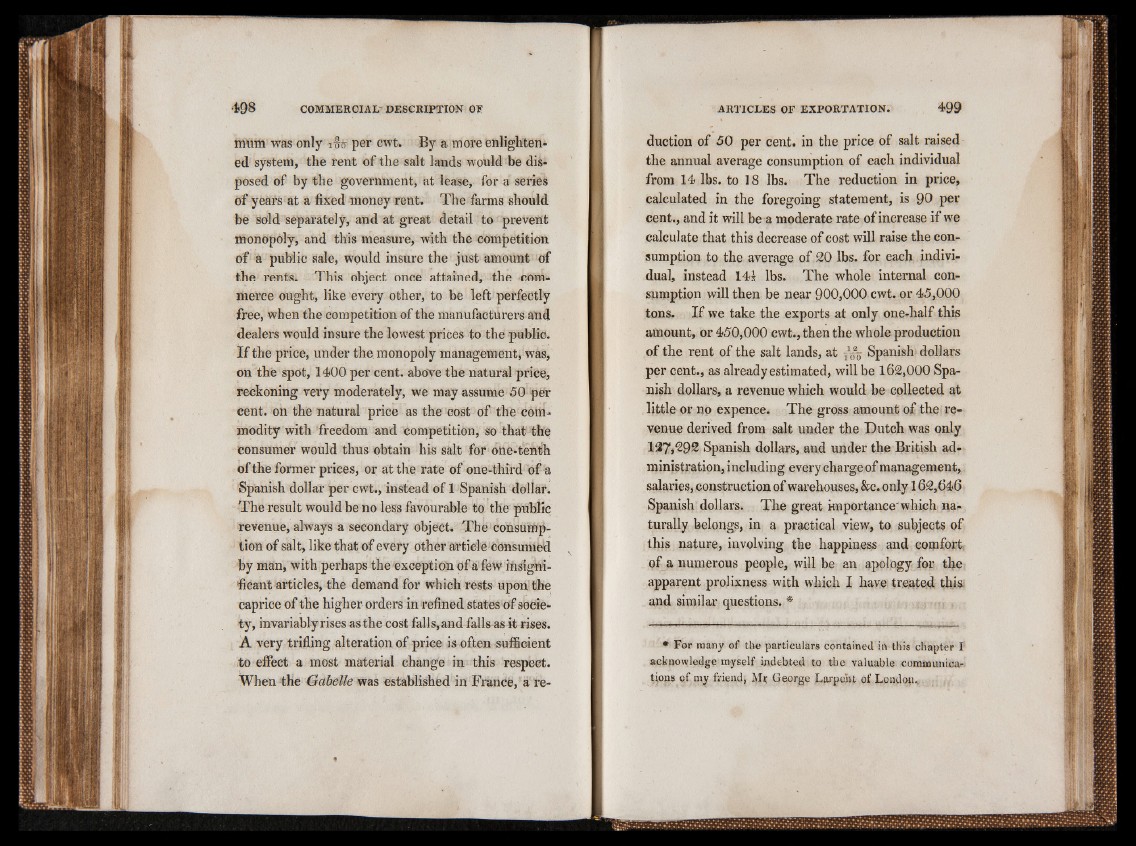
mum was only iftp per cwt. By a more enlightened
system, the rent of the salt lands would be disposed
of by the government, at lease, for a series
of years at a fixed money rent. The farms should
be sold separately, and at great detail to prevent
monopoly, and this measure, with the compétition
of a public sale, wçuld insure the just amount of
the rents. This object once attained, the commerce
ought, like every other, to be left perfectly
free, when the competition of the manufacturers and
dealers would insure the lowest prices to the public.
If the price, under the monopoly management, was,
on the spot, 1400 per cent, above the natural price,
reckoning very moderately, we may assume 50 per
cent, on the natural price as the cost of the commodity
with freedom and competition, so that the
consumer would thus obtain his salt for one-tenth
of the former prices, or at the rate of one-third of a
Spanish dollar per cwt., instead of 1 Spanish dollar.
The result would be no less favourable to. the public
revenue, always a secondary object. The consumption
of salt, like that of every other article Consumed
by man, with perhaps the exception of a few insignificant
articles, the demand for which rests upon the
caprice of the higher orders in refined states of society,
invariably rises as the cost falls,and falls as it rises.
À very trifling alteration of price is often sufficient
to effect a most material change in this respect.
When the Gabelle was established in France, a re-
Auction of 50 per cent, in the price of salt raised
the annual average consumption of each individual
from 14 lbs. to 18 lbs. The reduction in price,
calculated in the foregoing statement, is 90 per
cent., and it will be a moderate rate of increase if we
calculate that this decrease of cost will raise the consumption
to the average of 20 lbs. for each individual,
instead 14? lbs. The whole internal consumption
will then be near 900,000 cwt. or 45,000
tons. If we take the exports at only one-half this
amount, or 450,000 cwt., then the whole production
of the rent of the salt lands, at Spanish dollars
per cent., as already estimated, will be 162,000 Spanish
dollars, a revenue which would be collected at
little or no expence. The gross amount of the revenue
derived from salt under the Dutch was only
127,292 Spanish dollars, and under the British administration,
including every charge of management,
salaries, construction of warehouses, &c. only 162,646
Spanish dollars. The great importance'which naturally
belongs, in a practical view, to subjects of
this nature, involving the happiness and comfort
of a numerous people, will be an apology for the
apparent prolixness with which I have treated this:
and similar questions. *
* For many of the particulars contained in this chapter I
acknowledge myself indebted to the. valuable communications
of my friend, Mi; George Larpeht of London.,